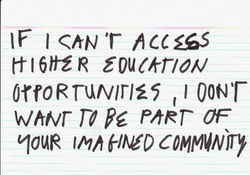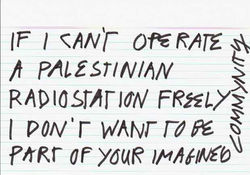
 |  |  |
|---|---|---|
 |  |  |
 |  |  |
 |  |  |
 |  |  |
 |  |  |
 |  |  |
 |  |  |
 |  |  |
 |  |  |
 |  |  |
 |  |
If I can’t, I won’t - If I don’t, I will
(Unshared Territories of Imagined Communities)
year: open ended since 2024
material: index cards, carrier object
If I can’t, I won’t. If I don’t, I will (unshared territories of imagined communities) A refusal that unfolds into a necessity, a necessity that folds back into refusal. What does this oscillation reveal about the ‘imagined communities’ that condition our bodies, our gestures, our possibilities?
Benedict Anderson described nations as i m a g i n e d c o m m u n i t i e s —constructed affinities held together by symbols, narratives, in- and exclusions. This work borrows that notion, but reconfigures it through refusal. As affirmative refusal that reverberates across different contexts, adapting to prohibitions that mark the limits of belonging.
The work takes the form of an open-ended volume of index cards. Each card refers to a law or regulation—operating on different scales, from nation-state legislation to regional, municipal, or situational rules—that restricts practices fundamental to communal life. These are laws that regulate who may dance, sing, love, gather, plant, or remain present, and under what conditions. Doings so significant for sustaining community that they appear, from a human perspective, as practices that should not require permission at all—yet they are denied to certain bodies, in certain places, at certain times.
These restrictions gathered here, do not name their territories; they move away from exclusion across geographies. They are small enough to be carried across borders and smuggled from hand to hand, continued, altered. With the possibility that each encounter contributes to the open-ended-volume. The cards are like vessels for recognising architectures of control—how the nation-state is not only imagined but enforced, embedded in the gestures it allows or forbids. But if the restriction is also an opening, if the prohibition reveals its undoing, then the loop continues: If I can’t, I won’t. If I don’t, I will.
Where does the impossibility fracture? Where does the prohibition turn porous? Where does the unshared dissolve?
Material structure / research format
The work consists of an open-ended collection of index cards, each recording a specific everyday activity that is restricted or prohibited within a given legal or administrative context—ranging from nation-state legislation to regional, municipal, and situational regulations—despite functioning, from a human perspective, as a socially shared or communal practice. Rather than cataloguing laws according to a single jurisdictional scale, the cards document prohibitions across multiple levels of governance. These rules often appear minor, intuitive, or counterintuitive when encountered in daily life. The entries are gathered through an ongoing research process and remain physically mobile via a carrier object.
The volume expands over time through encounters, conversations, and the contexts in which the work is presented. New cards emerge through exchanges with participants, who contribute practices that are limited or forbidden in their respective environments. The project does not privilege one legal scale over another; instead, it juxtaposes regulations across different levels in order to trace how belonging is conditioned through varying degrees of abstraction. In this way, the volume develops collaboratively and remains intentionally incomplete, foregrounding artistic research as a relational, embodied, and situated process.